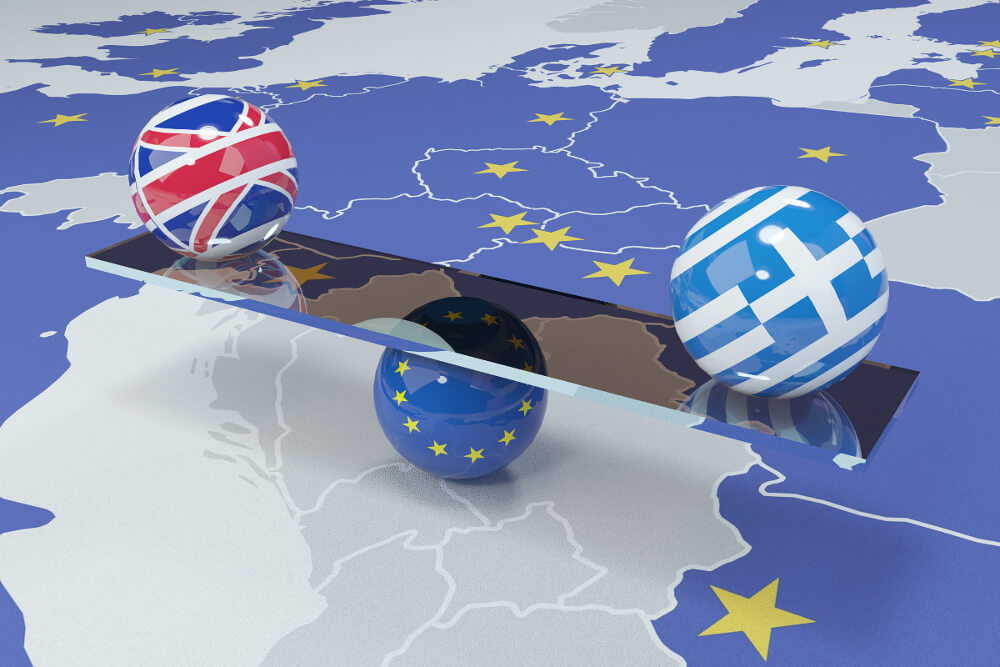Grexit concerns abate, Brexit remains the key focus
In the quaint summer of 2015, Europe, particularly Greece, was simmering, probably reminding one of the 1980s hit number “Cruel Summer” by British female pop band, Bananarama. The prospect of Grexit (Greece exiting the single-currency union of 19 countries, the Eurozone) was pretty real, leaving the European leaders fretting……and sweating! In August 2015, Greece, the birthplace of the Olympic Games, managed to obtain an €86 billion bailout, soothing frayed nerves among European leaders. Ironically, almost a year down the line and in the year of the Olympics, it was déjà vu as Greece stood near the Eurozone’s exit door yet again. However, in May 2016, Eurozone leaders hammered out a deal to release €10.3 billion (out of €86 billion) to Greece, and also announced their intention to consider debt relief to the embattled nation, leading Grexit fears to almost “Come Undone” (heard that track from British band, Duran Duran?).
Brexit fears to the fore
With Grexit fears having eased, all eyes are now set on the outcome of the Brexit poll to be held on June 23, 2016 as Britain seeks a referendum from its citizens to stay in or leave the single-market European Union, EU (the union of 28 European countries). If Britain votes for a divorce from the EU, it will have to notify the European Council of its decision, following which the UK will have two years to negotiate the terms of its exit.
Supporters of Brexit argue that post-Brexit, the UK would be able to wield more control over regulations, expand trade relationships (breaking free of the low-growth EU region) and not be required to contribute funds to the EU. On the contrary, here’s what Brexit critics opine:
-
Renegotiation of trade agreements:
The UK will have to renegotiate trade agreements with the EU on potentially unflattering terms, given that member nations enjoy a favorable status. Recently, the WTO joined a growing chorus of major international financial institutions warning the UK on the downside risks of Brexit (the IMF, the OECD and the World Bank have already decried Brexit in the past). The WTO’s foreboding for the UK includes billions of dollars in annual costs (incremental tariffs of £9 billion for imports and £5.5 billion on exports) and protracted renegotiation of trade pacts with the remaining 161 WTO member nations. The British government would have to negotiate trade terms for areas such as farming, higher education and scientific research, among others.
-
Sluggish growth prospects, adverse stock market impact and uncertainty:
The World Bank has warned that Brexit is one of the biggest risks facing the global economy, with developing nations already impacted by the commodity glut likely to be dealt a double blow. Moreover, Brexit could give rise to uncertainty (fear of the unknown), financial market volatility, adverse impact on output and a fall in UK’s real estate market. In the eventuality of Brexit, the OECD pegs the UK’s GDP to be lower by 3.3% in 2020 as compared to what it would be, if status quo were maintained.
-
The Pound could get pounded:
The sterling’s value could erode due to a reduction in capital inflows, investments and lower GDP growth prospects. Some analysts expect the GBP to be cheaper by a third against other major currencies. Concerns over Brexit pushed the GBP to a seven-year low versus the greenback on February 26, 2016, less than a week after Prime Minister David Cameron’s announcement of the referendum on the UK’s membership of the EU. Although the currency has recouped some of its losses since then, a weaker GBP could leave British tourists short-changed (literally) as their vacations abroad could get dearer.
-
Restricted employee mobility and loss of passport rights:
The single-market union offers free mobility for employment within the EU to citizens of member countries (~2 million UK nationals live in other EU countries). Moreover, the UK could witness an exodus of financial services companies, coupled with restrictions on access by the UK banks to the European markets due to possible loss of passporting rights.
-
Potential implosion of the EU:
This is the most adverse of all possibilities; however, in my view, the EU will pull out all stops to prevent it. If the UK is able to successfully manage the transition, dissent among other EU members could grow, causing them to weigh their options, thereby putting the EU at a serious risk of disintegration.
Considering the above factors, breaking away from the shackles of the EU could have deep ramifications for the UK. As the clamor against Brexit seems to be growing louder by the day, if citizens shun the option of quitting the EU, it could prove to be a historic event for Britain; a “Red-Letter Day” (a song by British pop stars, Pet Shop Boys)!
While many citizens would have grooved to the rendering of songs by fellow British artistes mentioned in this blog, the jury is still out on whether the nation’s votes on June 23 would swing in favor of the “Remain” or the “Leave” camp.









